Better Listening Starts with Values: The Foundation of Values-Driven Listening
Have you ever considered what really shapes the way you listen? Beyond techniques and habits, your personal development values—the beliefs, intentions, and purpose that guide your life—play a powerful role in how you show up in conversation.
Values-driven listening goes beyond simply hearing words. It means aligning your mindset, behaviours, and presence with what truly matters to you. This conscious approach to listening builds trust, empathy, and emotional intelligence—and it’s essential for effective workplace communication and leadership.
Let’s explore the five types of values and how they influence your ability to listen with intention.
1. Outcome Values: What You Want to Achieve
These are your goals and desired results—the “what” behind your listening. In the context of listening, outcomes might include:
Building stronger relationships
Fostering trust and connection
Creating safe spaces for open dialogue
For leaders listening better, these outcomes are especially crucial in creating supportive and productive team environments.
2. Behavioral Values: What You Need to Do
These values guide your day-to-day actions. In listening, they translate into:
Practising active listening techniques (paraphrasing, reflecting)
Asking thoughtful, clarifying questions
Prioritising listening over speaking
Demonstrating empathy consistently
These habits are foundational to strong listening skills in Australia’s diverse workplace and cultural environments.
3. Belief Values: What You Need to Think
These values shape your mindset and internal narrative. Listening beliefs may include:
Everyone has something valuable to share
Silence creates space for reflection
Listening requires more empathy than response
Belief values support conscious listening, helping you stay present instead of jumping to conclusions or advice.
4. Character Values: Who You Want to Be
These values define our character and shape our identity. They are the core principles that guide our interactions. In the context of listening, these might include:
- Honesty and integrity
- Authenticity and genuineness
- Compassion and empathy
- Respect for others and their perspectives
5. Greater Purpose Values: Why You Listen
At the deepest level, these values give your actions meaning. Examples include:
Helping others feel seen and heard
Creating more understanding in the world
Contributing to a more empathetic and connected society
When listening is guided by greater purpose, it becomes transformational—for both you and the people around you.
Visualising the Iceberg: Making Values Work for Listening
Think of these five value types like layers of an iceberg. Outcome values float at the top, easy to see, while greater purpose values lie deep below the surface—powerful, yet often unnoticed.
By understanding and aligning all layers, your listening becomes clearer, stronger, and more intentional. That’s the power of values-driven listening.
Next Steps: From Awareness to Action
Want to improve how you listen in everyday life and leadership? Begin by reflecting on your own values:
What matters most to you when you listen?
Which value types guide your behaviour?
Where can you better align intention with action?
For a deeper dive into these concepts and tools like the Integrated Values Iceberg©, explore our additional blogs or reach out about our workshops.
Final Thought: Lead and Listen with Intention
Leaders listening better starts with knowing who they are and what they stand for. When your listening is anchored in your values, you communicate with clarity, connection, and authenticity.
Conscious listening isn’t just a communication skill—it’s a powerful expression of who you choose to be.






